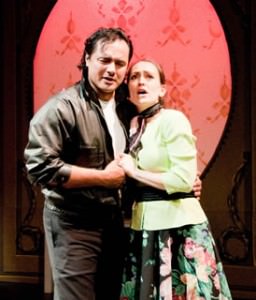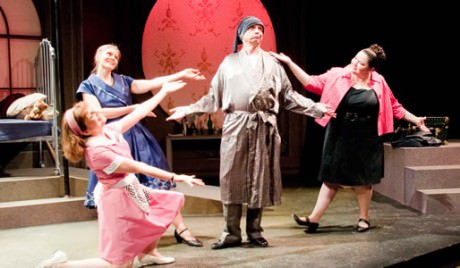The In Series, DC’s premier company for intimate opera and classical concerts, closes their season with a creative pairing of two very different, moving pieces in Pocket Opera: Love and Money.

Dancers, performers, and a trio of musicians take on L’Histoire Du Soldat or The Soldier’s Tale by revolutionary Russian composer Igor Stravinsky in Act One. One of the real strengths and freedom afforded the In Series, led by Artistic Director Carla Hübner, is the creative leaps they take to fit an opera into one’s pocket. Directors Jaime Coronado and Rick Davis, who also directs Johnny Schicchi, have taken one suite of six and part of another from the original production and combined them with a translation of a French libretto that is spoken by the four performers. The original instructions were that the work is to be “read, acted, and danced.” They return to those instructions.
Narrators Ashley Ivey and Gregory Stewart, dressed in tuxedo jackets of hodgepodge fabrics by Costume Designer Donna Breslin, begin the tale of a soldier returning home from “somewhere bad to somewhere not so bad,” a story that resonated deeply in 1918 and is unfortunately just as relevant today. Jase Parker dances the part of the soldier who is tempted by dancer Heidi Kershaw. She was dancing injured, but it was hardly noticeable in her seductive and mesmerizing moves. One of the best moments is when the two narrators dance together in the “Little Concert.” Choreographer Jaime Coronado makes wonderful tableaus of all the actors for the instrumental “Tango,” “Waltz,” and “Ragtime,” and integrates a soldier’s march and erect posture into dance in “March of the Soldier.”
The set by Landless Theater Co. includes three large translucent screens that act as windows where dancers can dance in silhouette and Lighting Designer Joseph R. Walls can project scenes and mood lighting on.
The musicians, violinist Sonya Hayes, clarinetist Evan Solomon, and piano player Frank Conlon, who also serves as Musical Director, deliver the quick, complicated and discordant score, so typical of Stravinsky’s work, with aplomb. It is an unexpectedly poignant piece and far away from traditional opera since no one sings a note, but is a very powerful performance.
In Act Two, they take on a very different opera, Johnny Schicchi (originally Gianni Schicchi), Giacomo Puccini’s final opera. It is a comic take on a family dealing with the aftermath of their Uncle Bruno’s death. Bari Biern, a 2013 Helen Hayes Award nominee, has rewritten the libretto, setting it in South Philly in modern times. The legacy of Uncle Bruno is, “the house, the apartment, the stocks, and the Cheese steak Restaurants,” which he has left to the church. His tragically bereft family hatches a plan to get the will redone before anyone notices he’s dead and enlists the help of the shady character Johnny Schicchi.
Pianist and musical director Frank Conlon took on Puccini’s expressive score that fits the music, song and emotion together so well. The piano arpeggios as the will is read is a particularly fine moment.
Lew Freeman (Simone) tackles Bruno’s brother in a fine Baritone. He is a DC institution, having performed around the city for years and is as funny as ever. Grace Groi (Zita) is the hilarious matriarch of the family. Eli Schulman (Jerry Junior) is in 5th grade and already tackling opera. He trains at Adventure Theatre MTC. Jesús Daniel Hernández has a powerful tenor in his role as the love struck fiancé of Lauretta (Laura Wehrmeyer), a frequent In Series star with her soaring soprano. She has the most recognizable aria of the piece, “O Mio Babbino Caro,” which in this version is, “Daddy Say Yes.” The two are best when they sing together on “Lauretta mia, staremo sempre qui!” or “Lauretta Mine, Here We Will Always Stay.”
Gene Galvin (Johnny Schicchi) makes the piece as the con man who turns the whole scheme on its head. He has a great voice, which is all the more impressive because he must impersonate the late Uncle Bruno for half the opera. The entire cast is so good and it’s a joy when they all sing together on “Farewell to Philly” and “The Greatest is South Philly.”

Pocket Opera: Love & Money is a beautiful end to a superior season at the In Series. They take major creative risks and execute flawlessly with superior performers for a moving, funny, jewel of a production.
Running Time: Two hours with one 15-minute intermission.
Pocket Opera: Love & Money plays through June 23, 2013 at GALA Hispanic Theatre – 3333 14th Street NW, in Washington, DC. For tickets, call 202-204-7763 or purchase them online.




